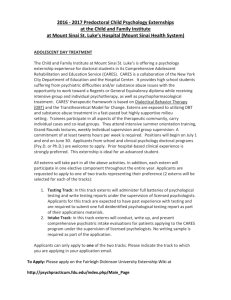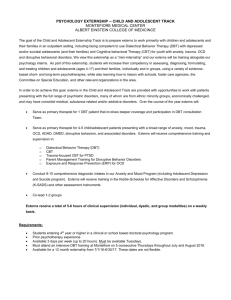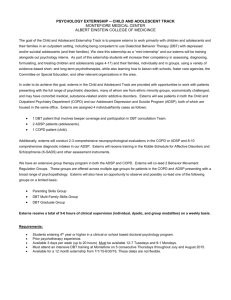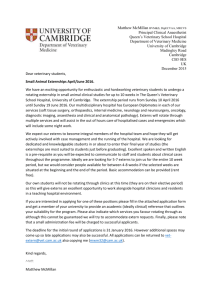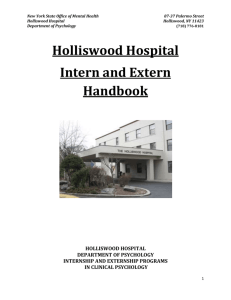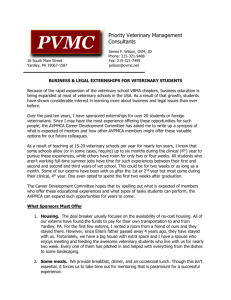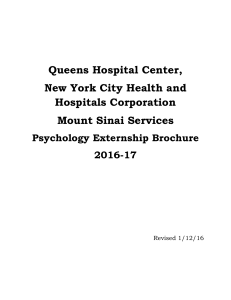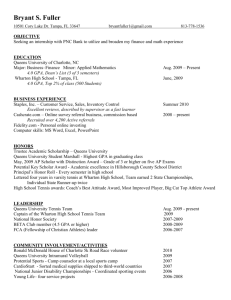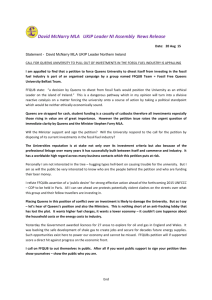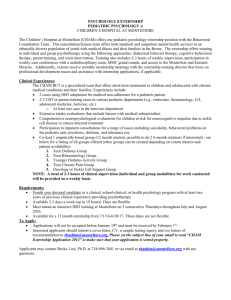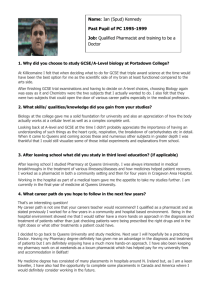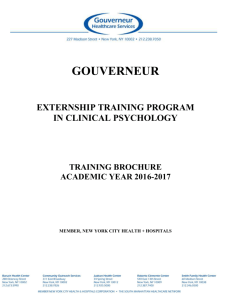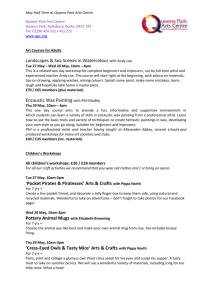New York City Children`s Center (NYCCC
advertisement
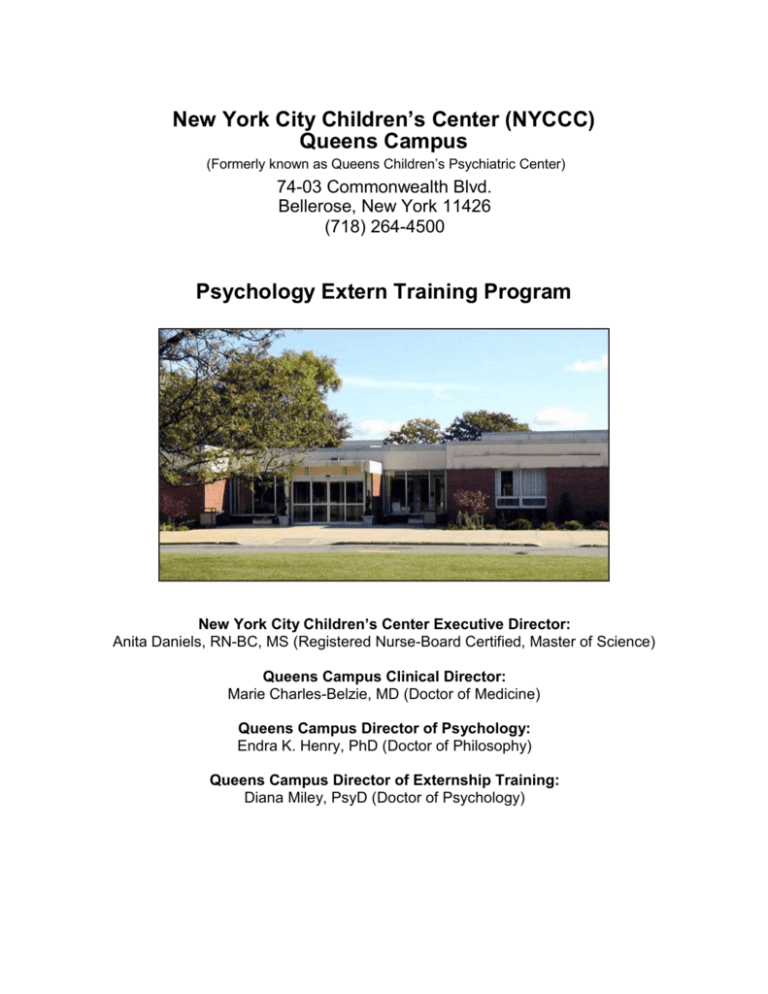
New York City Children’s Center (NYCCC) Queens Campus (Formerly known as Queens Children’s Psychiatric Center) 74-03 Commonwealth Blvd. Bellerose, New York 11426 (718) 264-4500 Psychology Extern Training Program New York City Children’s Center Executive Director: Anita Daniels, RN-BC, MS (Registered Nurse-Board Certified, Master of Science) Queens Campus Clinical Director: Marie Charles-Belzie, MD (Doctor of Medicine) Queens Campus Director of Psychology: Endra K. Henry, PhD (Doctor of Philosophy) Queens Campus Director of Externship Training: Diana Miley, PsyD (Doctor of Psychology) Introduction New York City Children’s Center–Queens Campus (NYCCC-Queens, formerly known as Queens Children’s Psychiatric Center (QCPC)) is a New York State Office of Mental Health facility that provides comprehensive behavioral health care services for children and adolescents with serious psychiatric challenges. The facility was opened in February 1970 under the direction of Dr. Lauretta Bender, who made the determination that children and adolescents at Creedmoor could be more effectively treated in an independent setting dedicated to their care than on a unit within an adult psychiatric center. NYCCC is one of the largest psychiatric facilities for children and adolescents in the United States. It boasts a strong commitment to community and family involvement and a large staff of mental health professionals and child care workers dedicated to providing coordinated treatment and services. Treatment is individualized, with an emphasis on family involvement and the application of best practices, and is carried out by multi-disciplinary teams comprised of psychiatrists, psychologists, pediatricians, social workers, nurses, recreational therapists, teachers, creative arts therapists, and specialized child care staff, with the assistance of comprehensive case management services. Since the early 1970s, the Queens Psychology Department has established solid training affiliations with local universities and has provided externship and practicum training for graduate students in clinical and school psychology programs. NYCCC-Queens also provides clinical traineeships for advanced child psychiatry fellows and adult psychiatry residents through affiliations with Columbia University College of Physicians and Surgeons and the North Shore-LIJ Health System. Facility Description In addition to providing inpatient services for all of Queens County, the Queens Campus of the New York City Children’s Center provides services to some children and adolescents from Brooklyn and the Bronx. Since 1995, the Queens Campus has also been responsible for intermediate care services for most of Manhattan, and day hospital treatment for children and adolescents in Manhattan. Accreditation: NYCCC is accredited by the Joint Commission on Accreditation of Healthcare Organizations. The Psychology Internship Program on the Queens Campus is accredited by the American Psychological Association. Page2 The Queens Campus patient care facilities consist of two buildings situated in Bellerose, Queens. Building 55, on which renovations were completed in 2007, contains the inpatient units, the outpatient clinic, and the administrative offices. Building 57, completed in 2008, is the Community Services building and houses two day treatment programs that provide services to youngsters ages 6-12 (Queens Day Treatment) and 13-18 (Upper School Day Treatment Program), a short-term Intensive Day Treatment program that serves youngsters 7-18 who are temporarily unable to be maintained in a more traditional academic or treatment setting, and the Intensive Case Management Program, which works in partnership with children and families to coordinate supports and services necessary to keep youngsters at home. Both buildings are located on Commonwealth Boulevard in Bellerose. In addition, the outpatient clinic located at the Robert F. Kennedy School on the Upper East Side provides early assessment of childhood emotional problems and high quality mental health treatment for youngsters in the borough of Manhattan. Patient Population: There are 84 inpatient beds and more than 200 day hospital and clinic patients receiving behavioral health care services at NYCCC-Queens. Admissions are generally on a voluntary basis, with patients referred by acute hospitals, schools, clinics, courts and community agencies. Clinical Services: The comprehensive program of care includes complete medical, psychiatric and psychological evaluations; individualized treatment plans; appropriate educational programming; supervised group experience to facilitate development of social skills; family counseling; and the development of community linkages for follow-up support. The NYCCC-Queens Inpatient Services Division provides comprehensive, individualized treatment, including psychotherapy, pharmacotherapy and educational programming, in a structured, therapeutic environment for children and adolescents up to age eighteen. The Community Services Division includes three day hospital programs, two outpatient clinics, an Intensive Case Management program, skill-based parent education, and outpatient clinical support services. Community and Family Participation: The Queens Campus has a large number of volunteers, including college students who work with youngsters under close supervision; an active Advisory Council of representatives of community groups, professionals, parents and legislators; and family advocates who support and empower youngsters and their families, with an emphasis on quality of care and consumer satisfaction. NYCCC-Queens is committed to the participation of family members in all aspects of treatment planning. Family therapy is strongly encouraged, and when appropriate, supportive services, including Intensive Case Management and homemaker services, are provided. Parents or guardians are asked to meet with children's therapists regularly, to attend planning conferences, and to participate in Parents' Advisory Committee Meetings. Parenting Classes are offered to provide family members with the resources, tools and services to help build successful families. Externship Training and Educational Goals Externship training is coordinated by Diana Miley, PsyD, Director of Externship Training and Endra K. Henry, PhD, Director of Psychology, Queens Campus. Philosophy: The philosophy of the Externship is one of balancing supervision and training with intensive involvement in assessment, treatment team activities and clinical work with children and adolescents with serious psychiatric challenges. Training in psychological testing and diagnostics is provided through case seminars, supervision by staff psychologists, and presentations at diagnostic conferences. Under close supervision, Externs are expected to provide family treatment in addition to seeing children and adolescents in individual and group therapies. Training in individual, group and family therapies, crisis intervention and treatment planning is provided through seminars, Grand Rounds, case consultations and supervised experience. Page3 The Externship provides in-depth training in assessment, psychotherapy, and treatment planning for psychology students who are enrolled in accredited graduate programs in clinical and school psychology. The orientations of the Psychology Department staff are varied and include cognitive-behavioral and psychodynamic perspectives. Training is integrative and child-centered. Goals: The educational goals of the Externship are to develop existing skills in assessment and treatment, to familiarize trainees with the complexities of severe psychopathology and the role of the psychologist in interdisciplinary treatment teams, and to encourage and provide opportunities for professional growth. Clinical work with families is considered a crucial aspect of the training. Sensitivity to both cultural diversity and ethical standards is considered essential. Responsibilities: Externs typically see a minimum of two patients and families; co-lead psychotherapy groups; complete eight to ten psychological assessments per year; participate in treatment team activities and attend hospital Grand Rounds, diagnostic conferences, case conferences, and training lectures. Supervision: Externs are provided with at least two hours of individual supervision per week by a supervising psychologist, who directly oversees Externs’ work on the units to which they are assigned. Additional supervision is provided as needed. Members of the Psychology Department are experienced with behavioral and psychodynamic approaches to treatment and are highly experienced in clinical work with families. Several supervising psychologists have completed advanced postdoctoral training. Seminars: In addition to weekly supervision, Externs participate in Clinical Treatment seminars. Seminars include Case Formulation and Psychotherapy Process, Hospital Systems and Treatment, and an Extern Process group. Psychopharmacology Case Consultation and supervision in Trauma-Focused Cognitive Behavior Therapy are also provided. Externs are expected, when able, to participate in other training seminars and hospital sponsored lectures and workshops, including Grand Rounds. Externs’ Duties: Externs are generally expected to work two and one-half days per week from September through June, as permitted by University policy or regulations. After a brief period of orientation, Externs are expected to serve as primary therapists for assigned cases, which may be on an inpatient or day hospital unit. Under supervision, Externs complete psychological assessment; provide individual, group and family therapies; and manage treatment and discharge planning. Externs participate in a variety of unit meetings and are expected to present cases at diagnostic conferences. Externs meet with assigned patients a minimum of two times per week in individual therapy and are also expected to do family work. Externs may also conduct group therapy with an experienced co-therapist. In order to ensure exposure to a range of patients and supervisors, opportunities to complete psychological testing on units other than the primary units to which Externs have been assigned are provided. Training Sites: Externs are assigned to training sites and units, and efforts are made to accommodate their preferences. The following sites are usually available for Extern training; the first five of these are located in Queens, the sixth in Manhattan: Upper School Day Hospital: Externs assigned to the Upper School Day Treatment unit work with adolescents aged thirteen to eighteen years, providing individual and group therapy within the context of a Dialectical Behavior Therapy Program. Page4 Queens Day Treatment: Externs assigned to the Queens Day Treatment unit conduct individual, play, family and group therapies with patients aged six to twelve years in a fully integrated clinical and educational program. Inpatient Units 554/555: Externs’ work on these co-ed units involves comprehensive team treatment of hospitalized youngsters from ages five through fourteen. Individual, family, play and group therapy approaches are used with these patients. Trauma-Focused Cognitive Behavioral Therapy is integrated, when indicated, to help foster recovery following traumatic exposure. Inpatient Units 552/556: Externs’ work on these co-ed units involves intensive team treatment of hospitalized youngsters from ages fourteen to eighteen. Individual, family and group therapy approaches are used with these patients. Trauma-Focused Cognitive Behavioral Therapy and Dialectical Behavior Therapy are integrated, when indicated, to help reduce negative emotional and behavioral responses and advance successful functioning following traumatic exposure. Inpatient Units 553/557: Externs’ work on these Girls units involves intensive team treatment of hospitalized females from ages twelve to eighteen. Individual, family and group therapy approaches are used with these youngsters, within the context of a Dialectical Behavior Therapy Program on Unit 557. TraumaFocused Cognitive Behavioral Therapy is integrated, when indicated, to help reduce negative emotional and behavioral responses following traumatic exposure. Adolescent Clinic – Manhattan: This program, located at the Robert F. Kennedy School on the Upper East Side of Manhattan, blends aspects of day treatment and outpatient clinic programs and serves youngsters up to age 16. Externs assigned to this unit provide individual, family and group therapies, and complete psychological testing. Prerequisites: Full time, matriculated candidates who are enrolled in clinical or school psychology programs whose Externship or clinical practicum will be used to satisfy degree requirements will be considered. Selection Criteria: Requirements for acceptance as an Extern include: 1) the University’s written approval for Externship 2) submission of a curriculum vitae (CV) or resume 3) a sample testing report 4) a personal interview. Application Process: Interested students should contact: Diana Miley, PsyD Director of Externship New York City Children’s Center – Queens Campus 74-03 Commonwealth Boulevard, Bldg. 57 Queens Day Treatment Bellerose, NY 11426 Tel: (718) 264-4955 E-mail: Diana.Miley@omh.ny.gov Page5 Students who are selected for the Externship must have completed at least two years of fulltime graduate study. Students should also have completed basic courses in cognitive assessment and projective testing by the beginning of the Externship year. Please note: Consideration for inpatient units will be given to candidates who will be 4 th year students at the start of Externship.
